#picture books are the exception
Explore tagged Tumblr posts
Text
Every time I hear the writing advice "Show, don't tell", my initial reaction is like... what do you mean? Writing is all words. I can only tell you a story. I can't show you shit because this isn't a movie. I'll tell you what happens in the story in great detail using ALL THE WORDS!
#I know what it means#but the four year old in my brain is like “this is not logical”#writing is all words stupid#writing#talking about writing#on writing#writing advice#the writing process#creative writing#show don't tell#I'm not the only one right?#literally every time I'm like the Jennifer Lawrence meme#what do you mean?#what do you meaaaaaan#I'm not even a bard who can wave my hands about for the audience to see while telling the story#I only have words#I can only tell you the story#picture books are the exception#pop-up books are an even bigger exception
7 notes
·
View notes
Text
I usually see people try to visually represent baby Bill's "strange eye" either by giving his parents more eyes, or by drawing his parents in 2D mode with their eyes on their sides while leaving Bill drawn in 3D mode with his eye in the middle
But what if he

"Gee Bill how come YOU can see 'up'?" "My pupil's taller than yours."
#(of course in universe his pupil would just look weirdly wide to everyone rather than tall)#(none of these are actual OCs. i just made up a bunch of random family members for this picture.)#(except the trapezoid in the back. he's an OC.)#euclydia#the book of bill#bill cipher#scalene cipher#euclid cipher#gravity falls#fanart#my art#headcanons
366 notes
·
View notes
Note
hey you might've been asked this before sorry if so, but have you read or do you have any thoughts on A short history of Trans Misogyny?
I have read it! I have a few thoughts.
I think it's a strong and important work that compiles historical archives into sharp analyses of how "trans misogyny" (using Jules Gill-Peterson's spacing) is not a recent phenomenon but a globalized structure with centuries of history. I also think it's flawed, for reasons I'll get into after a quick summary for those who haven't had the chance to read it yet.
JGP divides the book into three main chapters, the first on the notion of "trans panic". There, she traces how variants of this anxiety with the trans-feminized subject have presented—to deadly effect, for the subject—in such different settings as early colonial India, the colonization of the Americas, the racialized interactions between US soldiers stationed in the Philippines and the local trans women living there, and of course the contemporary United States itself. In every case she analyzes this "panic" as the reaction of the capitalist colonial enterprise to the conceptual threat that the trans-feminized subject poses; we are a destabilizing entity, a gender glitch that undermines the rigid guarantees of the patriarchal order maintaining capitalism. Punishment follows.
The second chapter is my favourite, and considers the relationship between transfeminine life and sex work. I posted a concluding excerpt but the thrust of the chapter is this: that the relegation of so many trans women and trans-feminized people to sex work, while accompanied by the derogation and degradation that is associated with sex work, is not itself the mere result of that degradation inflicted upon the subject. In other words, it is not out of pure helplessness and abjection that so many trans-feminized people are involved in sex work. Rather, sex work is a deliberate and calculated choice made by many trans-feminized people in increasingly service-based economies that present limited, often peripheralized, feminized, and/or reproductive, options for paid labour. Paired with a pretty bit of critical confabulation about the histories of Black trans-feminized people travelling the US in the 19th century, I think this made for great reading.
In her third chapter, JGP narrativizes the 20th century relationship between the "gay" and "trans" movements in north america—scare quoted precisely because the two went hand-in-hand for much of their history. She emphasizes this connection, not merely an embedding of one community within another but the tangled mutualism of experiences and subjectivities that co-constituted one another, though not without tension. Then came the liberal capture of the gay rights movement around the 70s, which brought about the famous clashes between the radicalisms of Silvia Rivera and Marsha P Johnson (neither of whom, JGP notes, ever described themselves as trans women) and the institutions of gay liberalism that desired subsumption into the folds of capital. This is a "remember your history" type of chapter, and well-put.
I think JGP is correct to insist, in her introduction, on the globalizing-in-a-destructive-sense effects of the colonial export of trans womanhood. It is, after all, an identity conceived only mid-century to make sense of the medicalized trans subject; and "gender identity" itself (as JGP describes in Histories of the Transgender Child) is a psychomedical concept conceived to rein in the epistemic instability of trans existence. This is critical to keep in mind! But I also think JGP makes a few mistakes, and one of them has to do with this point.
In her first chapter, under the discussion of trans misogyny in colonial India, JGP of course uses the example of the hijra. Unfortunately, she commits two fundamental errors in her use: she mythologizes, however ambiguously, the "ascetic" lives of hijra prior to the arrival of British colonialism; and she says "it's important to say that hijras were not then—and are not today—transgender". In the first place, the reference to the "ascetism" of hijra life prior to the violence of colonialism is evocative of "third-gender" idealizations of primeval gender subjectivities. To put the problem simply: it's well and good to describe the "ritual" roles of gendered subjects people might try to construe contemporarily as "trans women", the priestesses and oracles and divinities of yore. But it is best not to do so too loftily. Being assigned to a particular form of ritualistic reproductive labour because of one's failure to be a man and inability to perform the primary reproductive labour of womanhood-proper is the very marker of the trans-feminized subject. "Ascetism" here obviates the reality that it wasn't all peachy before (I recommend reading Romancing the Transgender Native on this one). Meanwhile, in the after, it is just wrong that hijra are universally not transgender. Many organize specifically under the banners of transfeminism. It's a shame that JGP insists on keeping the trans-feminized life of hijra so firmly demarcated from what she herself acknowledges is globalized transness.
My second big complaint with the book is JGP's slip into a trap I have complained about many times: the equivocation of transfemininity with femininity (do you see why I'm not fond of being described as "transfem"?). She diagnoses the root of transmisogyny as a reaction to the femininity of trans women and other trans-feminized subjects. In this respect she explicitly subscribes to a form of mujerísima, and of the trans-feminized subject as "the most feminine" and (equivalent, as far as she's concerned) "the most woman". Moreover, she locates transfeminist liberation in a singular embrace of mujerísima as descriptive of trans-feminized subjectivity. As I've discussed previously, I think this is a misdiagnosis. Feminization is, of course, something that is done to people; it is certainly the case that the trans-feminized subject is in this way feminized for perceived gender-failure. This subject may simultaneously embrace feminized ways of being for all sorts of reasons. In both cases I think the feminization follows from, rather than precedes, the trans misogyny and trans-feminization, and there is a fair bit of masculinization as de-gendering at play too, to say nothing of the deliberate embrace of masculinity by "trans-feminized" subjects. Masculinity and femininity are already technologies of gender normalization—they are applied against gender deviation and adapted to by the gender deviant. The deviation happens first, in the failure to adhere to the expectations of gender assignment, and I don't think these expectations can be summarized by either masculinity or femininity alone. I think JGP is effectively describing the experience of many trans-feminized people, but I do not think what she presents can be the universalized locus of trans liberation she seems to want it to be.
Now for a pettier complaint that I've made before, but one that I think surfaces JGP's academic context. In her introduction she says:
In truth, everyone is implicated in and shaped by trans misogyny. There is no one who is purely affected by it to the point of living in a state of total victimization, just as there is no one who lives entirely exempt from its machinations. There is no perfect language to be discovered, or invented, to solve the problem of trans misogyny by labeling its proper perpetrator and victim.
Agreed that "there is no perfect language to be discovered"! But JGP is clearly critical of TMA/TME language here. Strange, then, that less than ten pages later she says this:
this book adds the phrase trans-feminized to describe what happens to groups subjected to trans misogyny though they did not, or still do not, wish to be known as transgender women.
So JGP believes it is coherent to talk about "groups subjected to trans misogyny", which she thinks consists of the union of trans women and what she called "trans-feminized" groups. If this is to be coherent, there must be groups not subjected to trans misogny. So we've come around to transmisogyny-subjected and not transmisogyny-subjected. Look: you cannot effectively theorize about transmisogyny without recognizing that its logic paints a particular target, and you will need to come up with a concise way of making this distinction. But JGP dismissing TMA/TME with skepticism about "perfect language" and immediately coining new language (basically TMS/not TMS) to solve the problem she un-solved by rejecting TMA/TME... it smells of a sloppy attempt to make a rhetorical point rather than theoretical rigour. It's frustrating.
I have other minor gripes, like her artificial separation of "trans women" from "nonbinary people" (cf. countless posts on here lamenting the narrow forms of existence granted TMA people if we want recognition as-such!) or her suggestion that "a politics of overcoming the gender binary" is mutually exclusive from rather than necessarily involved with struggles around "prison abolition, police violence, and sex work". Little things that give me the sense of theoretical tunnel-vision. But I don't think all this compromises the book's strengths as a work of broad historical analysis. I would simply not take every one of its claims as authoritative. Definitely give it a read if you have the chance, especially for the second and third chapters.
#ask answer#jules gill-peterson#(i haven't been asked this before ty for asking <3 🐐)#note that this was mostly off the cuff except what i had taken pictures of bc i left the book in toronto for my mom to read
534 notes
·
View notes
Text
Someone please yell at me about the Emily Wilde series because it is criminally underrated and it singlehandedly brought the whimsy back into my life
#.ioana reads#emily wilde#heather fawcett#is there a fandom for this??? i NEED to get the pictures out of my head#there are so many gorgeous things to draw from those two books#i love them to bits it's howl's moving castle meets the mummy except it happens in weird places#around the mountains#and look sjm could NEVER#this is how you do a fae romance#emily wilde’s encyclopaedia of faeries#emily wilde's map of the otherlands#i cannot wait for the third one to come out ahh 😩😩😩#.ioana rambles
120 notes
·
View notes
Text

Suptober - Day 15 || Abstract [x]
#suptober23#destiel#dean winchester#castiel#destiel fanart#supernatural#spnfanart#wiggleart#I struggled with this one bc abstract can be so … abstract lol#but then I remember I liked the piet Mondrian pictures so this is inspired by that#also this is the last day except for Oct. 31 for official suptober prompts#I posted the extended list I brainstormed with a friend on my coloring book announcement#which is linked#so that will be the coming days!
236 notes
·
View notes
Text
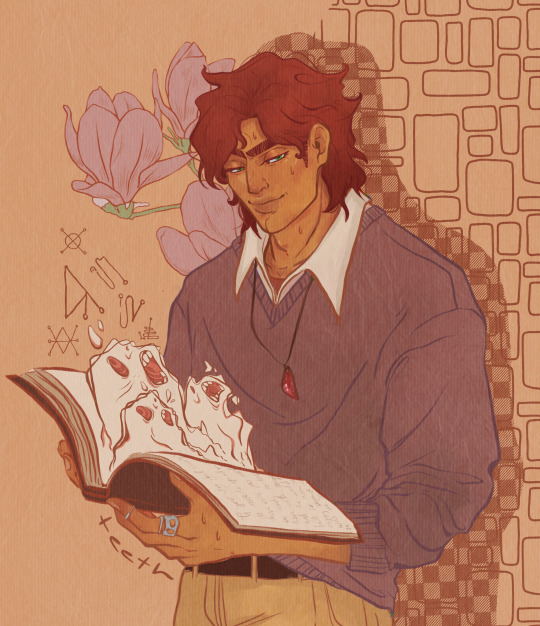
He’s trying to be cool about it but he shouldn’t have opened that and you should probably get out of there…
#shepherds of haven#red antiqua#like everyone else I’ve been playing bg3 and every time I talk to Gale I want to talk to red instead#also Anders but like out of all of them red is the standout favourite#less… explosive……. yanno#I just threw shoujo flowers and a bunch of textures on this I’m rly happy with his hair and skin#I’m not sure on the composition but I guess it’s a learning curve#this was originally part of a bunch of sketches I did of red and I took it and made it it’s own picture#I just love him ok#the writing in the book says something about how these demons can only be banished with a filthy pash so he has his work cut out for him#and he doesn’t want you to see#impulsivity got the best of him again#mc…… uh. I’m so happy to see you but uh. don’t watch this I’m begging you#guess he’s wearing normal people clothes and I don’t have a reason for why except that I think red wears big jumpers when he’s not in#slutty mage gear#fanart#fantasy#if games#shoh
190 notes
·
View notes
Text
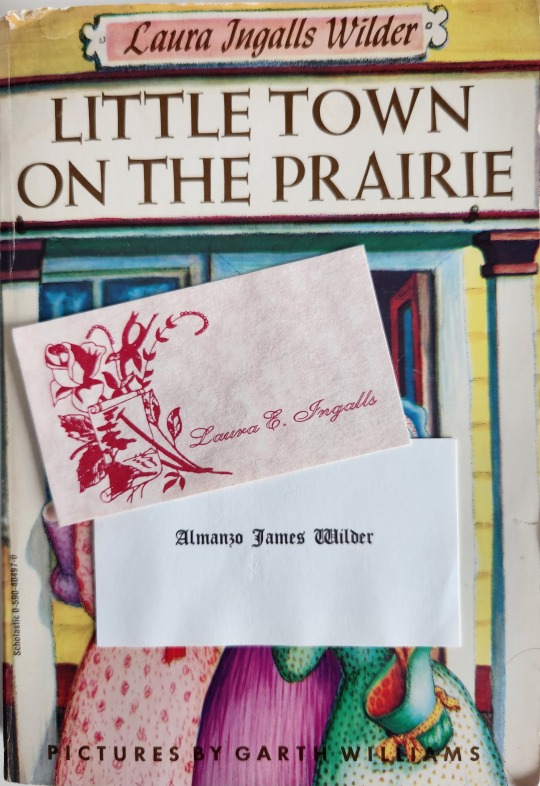
"I have been getting my name cards," she heard herself saying.
"That so?" he said. "Mine are just plain cards. I brought them out from Minnesota."
He took one from his pocket and handed it to her. He was driving with one capable hand, keeping the lines in play between his gloved fingers. The card was plain and white. Printed on it in Old English letters was, Almanzo James Wilder.
[...]
"Do you--do you want your card back?"
"You can keep it if you want to," he replied.
"Then do you want one of mine?" She took one out of the package and gave it to him.
He looked at it and thanked her. "It is a very pretty card," he said as he put it in his pocket.
#little town on the prairie#little house#laura ingalls wilder#laura's card doesn't match the book description at all except for color#and probably this picture has no reason to exist#but look i have one (1) piece of bookish merchandise and i'm going to make use of it#(it turns out laura's card was in silver lake)#(i just didn't find it when reading because i read the early half all on audio)
52 notes
·
View notes
Text
Watched the Gladiator 2 trailer and it just doesn't feel right. I haven't enjoyed a Riddley Scott film since American Gangster so I'm not expecting anything but the production felt more prestige TV then prestige film. Maybe it needs more time in post for a final polish.
But I'm also going to go in unable to enjoy it because they're using one of the best sub stories of Roman history, the feud between Caracalla and Geta. We're talking brothers who became going emperor but hated each other so much they literally built a wall down the center of the palace. The praetorian guard was divided in two with each one having their own guards (the guard was past its height of power anyway). And it ends with Caracalla killing Geta in front of their mother, at a meeting arranged by their mother to plead with them not to kill each other. Then Caracalla gets the title "common enemy of mankind" because of how horrible he was. BUT, this is not good brother evil brother. Geta was also terrible.
Based on how little he cares about history I know Scott is going to mess it up.
#denzel as macrinus can work but i always pictured macrinus more a book worm#like I'm thinking young Donald Glover would have worked#anyone comaining about casting a black actor as a Roman will get blocked though#there were black Roman emperors. specifically severus and his sons#caracalla and geta#there were no white emperors#in fact the Romans were generally accepting of all ethnicities except one#they hated northern Europeans and if you were of northern or central European heritage they would not let you be emperor#gladiator#gladiator 2
14 notes
·
View notes
Text
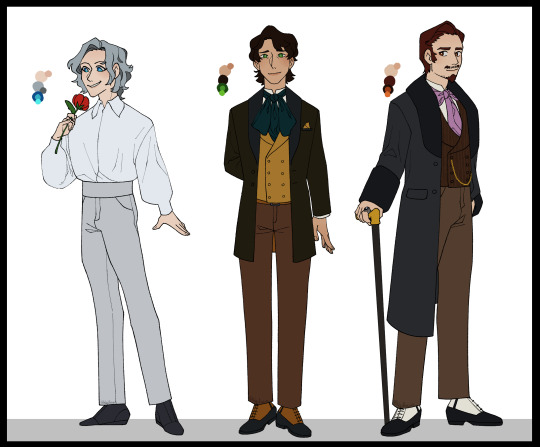
Alternate designs for the trio based on the chinese prod actors..
Was just gonna do an under the clothes ref for dorian but then i was like well, if i do it for dori might as well do it for the rest of them
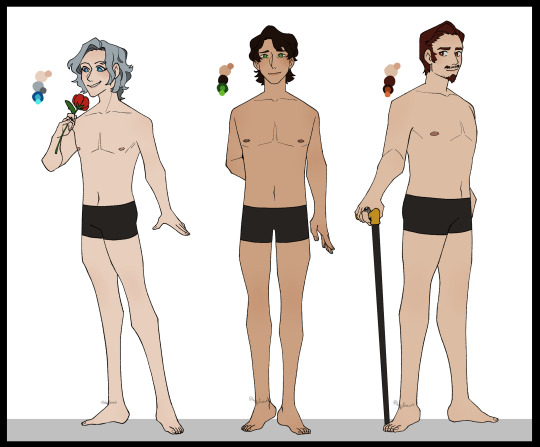
#klq dorian gray#the picture of dorian gray#dorian gray#basil hallward#lord henry wotton#these ended up becoming much more book accurate LOL i think the chinese prod really tried much harder to stick with book descriptions#except of course silver hair dori#i had to keep the hair silver i love it so much#dilf henry is comin after my ass help#i definitely didnt design a dorian and basil so i can draw the basil stabbing scene again that was definitely not my nefarious plan
130 notes
·
View notes
Text
My book!

Clear Cut
(I know it’s unlikely but please don’t repost)
#my art#this is printed on ~24 pages of clear plastic#with half of a line (cut vertically) on each page#it cannot be read like a normal book#I’m including the picture like this because I think it’s fitting that everything except this was removed from the image#and it’s the best way I can think to digitize it#original oat
71 notes
·
View notes
Text
Serious question. how rich would i have to be to establish a huge, well-furnished, elaborate children’s museum / library / play area / public park and also GUARANTEE that it would never ever cost parents money to let their kids play there.
#it’ll probably never be possible#but i’m picturing something like the City Museum in St Louis#except there’s also dinosaur exhibits and fun science stuff#and also a huge library that’s not beholden to government book bans#and it’s surrounded by a public park#AND it’s free#it just makes me so sad how few fun things there are now for kids to do that don’t cost money#and aren’t being targeted by politicians like libraries are#text post
18 notes
·
View notes
Text
sometimes i have to read something three times before i understand it okay
#except i’m not talking about poetry im talking about picture books#sometimes things are hard for me#yes i’m in an advanced class on rhetorical anyalysis#no i’ve never understood anything#do yall like aubades#they’re poems about lovers leaving eachother at dawn#there’s so many of them they have their own category#i like them#221talks
3 notes
·
View notes
Note
Hellooo~ Im interested to know more about Elise :)
For the ask game would you be able to do : ∇ - old age/aging headcanon ?
Hi!!! Thanks so much for the ask! ❤️
∇ old age/aging headcanon
I haven't put a lot of thought into Elsie old yet BUT...
First, Elsie and Sebastian’s relationship is going to get complicated. She's under the impression that once she graduates from Hogwarts, her parents are going to drop the whole "arranged marriage" thing since she's a witch - nope. It's going to make things very awkward when she has to tell them that she's seeing Sebastian and finds out that they think "the whole magic business" was just a phase. 😬
Also, careers become a bit of an issue, but that's for them to hash out in my fic.
It'll work out. But it's going to be difficult and leave them with some tough decisions along the way.
Because of this, they marry fairly young and quickly. Elsie doesn't want anything extravagant because that's what had been expected of her her whole life. When she finally gets to make her own choices, she wants the wedding to represent love and not the showing of wealth.
After, it takes them years before they vaguely decide that they might be ready to possibly consider having kids. Like, at least five years. When it does happen, it's not exactly planned and uhhhh two obsessive researching bookworms trying to figure out everything all at once for a magical pregnancy is going to be an interesting dynamic. (It'll be fine though🙂 their friends will come by to slap some sense into both of them separately.)
I believe that after the first pregnancy (and subsequent freak outs) everything afterwards will be easier. But they're most likely not going to be having a house full of several children. They will, however, have a bunch of grandchildren, which will make up for it.
#i don't have names for their children yet#well except their first#but shhhh it's a secret#this one made me laugh#i just picture them hoarding all the pregnancy books#this is what i meant by taking turns for 3am yaps#hogwarts legacy mc#elsie corvin#sebelsie#headcanon ask#ask box#asks
5 notes
·
View notes
Text
one of the lesser talked about fun things about intentionally reading more books is finding new stuff to be a bit of a hater about tbh
#and i know sometimes im probably just not properly picking up whatever the writer is putting down but whatever it's still fun#to actually know what you think about stuff like the highly regarded classics and extremely popular hyped up things#here are a few writers im a bit of a hater about w my opinions now btw#neil gaiman: does not do it for me at alllll#have read the graveyard book and american gods and hated almost every minute of both#in american gods i just found the aesthetic ideas and characters completely unappealing and in the graveyard book#i thought it was dreary and not well described enough... kept feeling like it was too bare bones in some way to picture things properly#i was like 'hmm i wish this was one of his graphic novels instead bc i'd like to be able to see what's going on here a bit better...'#also his humour just never lands for me and i do not often get his references either#ray bradbury annoys me in a similar way to neil gaiman but also somewhat oppositely like where#the way they write characters and plots and ideas and the stuff they care about gets on my nerves in an almost identical way#that i don't know how to define except to say i had a bit of a 'same energy' experience reading Something Wicked This Way Comes#and some of neil gaiman's stuff#but unlike neil gaiman i think that ray bradbury attempts to describe things unusually so much and TOO much#to the point that it takes me out of the story in a different yet similar way#to how the lack of description in neil gaiman's stuff does#what else have i become a bit of a hater about or did not get the appeal of lately? hmmm#oh hp lovecraft hahahaha#least scary stories ever god everything he's scared of is so dumb#like even aside from his extremely racist takes and fear of the 'exotic other' his fears about being cosmically insignificant are just like#yeah and? whats so scary about that hahaha i literally just dont get it#also the amount he writes dialogue in heavy accents annoys the shit out of me#p
15 notes
·
View notes
Text
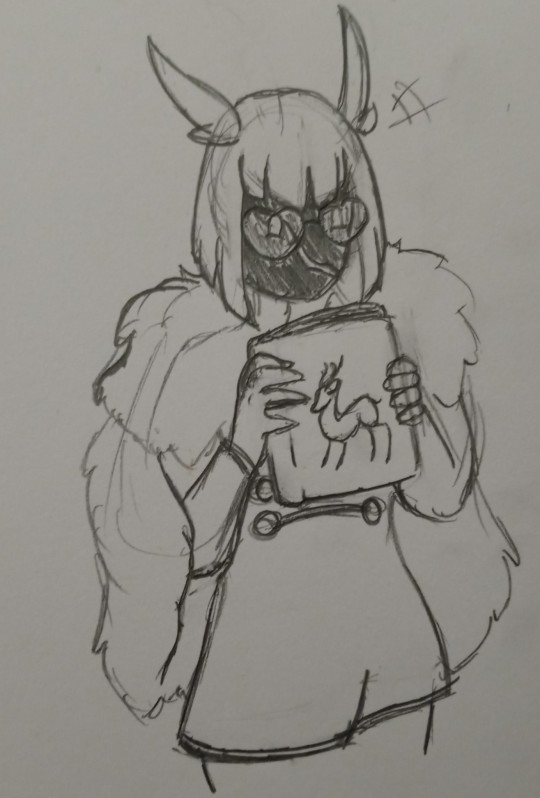
Finally got around to concept doodling an OC created during Days of Style.


Calling her The Librarian. (Unless that's already taken. Just a placeholder until I think of something better/easier.) And I've already got a personality planned out for her:
📚 Hosts live book readings at least twice a week.
😱 Please do not leave "dog ears" in books!!
💙 Addicted to the smell of books (the older, the better)
🖋 Loves encouraging aspiring authors.
#fanart#concept sketch#OC concept#Sky: Children of the Light#Sky: CotL#That Sky Game#The Librarian#Sky OC#game screenshots#I kinda threw most of her personality together at the last minute#except the live book reading and the book huffing parts#oh yeah. she totally huffs books#HAVE YOU EVER SMELLED A BOOK???#unfortunately I will never be able to wear this in game#because TGC has yet to “somehow bring back past season ults”#couldn't find a good ref picture of the Peeking Postman outfit for the concept#also just having a bad hand day
11 notes
·
View notes
Text

my last 5 books on goodreads look soo good together it's a pity i haated one of them
#the chromatic fantasy was SOOO good though highly recommend. also the edges are stained SHINY GOLD and when i returned it the librarian#got distracted looking at how pretty it was instead of checking in my books. also highly recommend godfather death it was a gorgeous pictur#book with a classic fairy tale feel. i liked moonbound and it was good for a scifi/fantasy/adventure combo with a typical story structure#and a lot of fun and interesting details in the worldbuilding. you glow in the dark was short stories and some of them i really disliked bu#a couple of them were really good. and i shant say anything about the extinction of irena rey except that by the time i finished it the onl#thing i liked was the cover and even that was halfhearted.#talkin#reading tag
4 notes
·
View notes